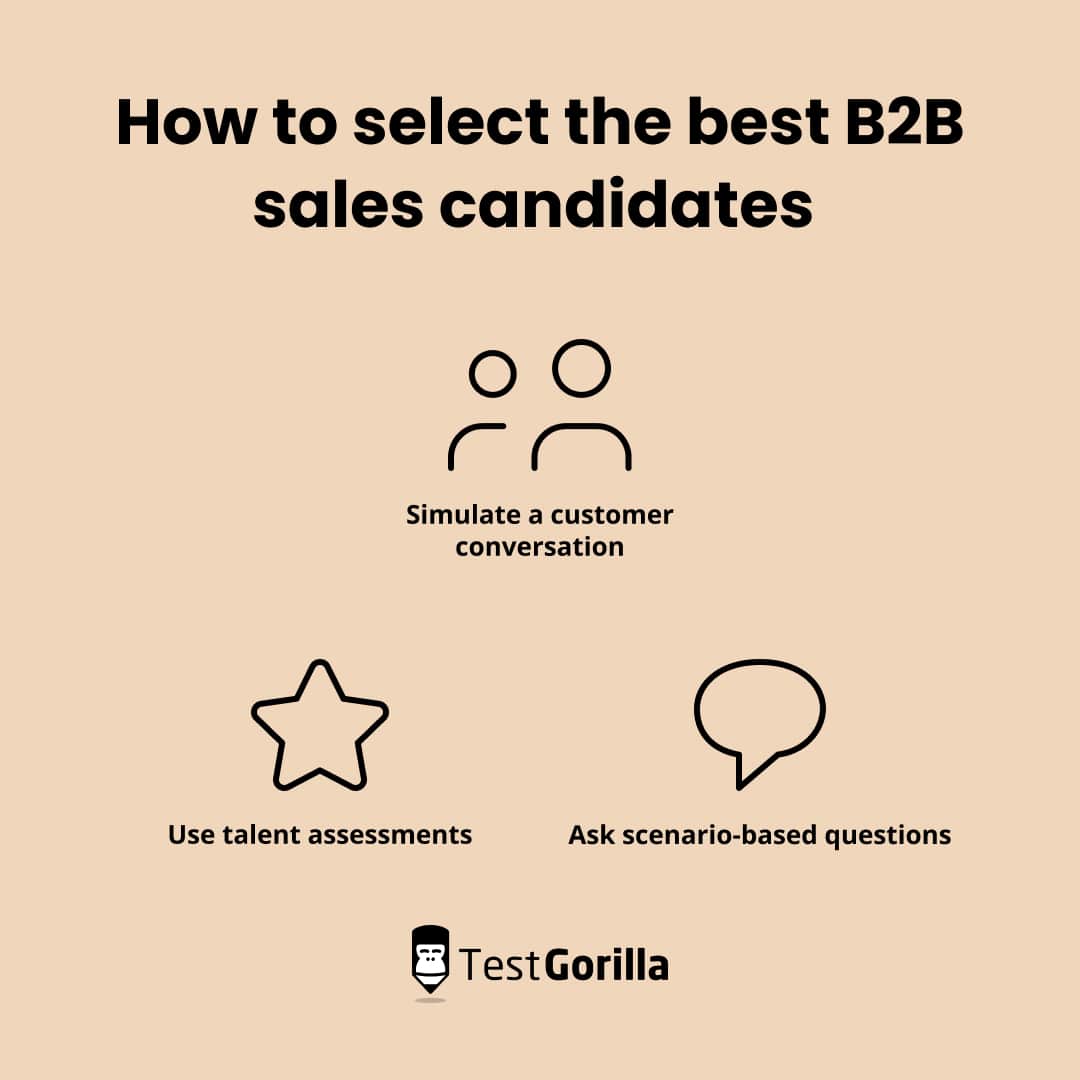A talented business-to-business (B2B) salesperson does more than boost your bottom line. They win client deals that support your mission and keep your workforce engaged.
However, their specialized skill set can be hard to identify and assess. Additionally, striking a balance between salary and commission when planning compensation is tricky. But without resolving these issues, you risk hiring reps that endanger your sales targets and team motivation.
Don’t fret – our guide will outline how you can hire B2B sales reps effectively. We cover important do’s and don’ts, places to find candidates, and ways to evaluate skills with sales assessments and interviews.
Let’s dive in.
Table of contents
What you need to know before hiring a B2B salesperson
Before you hire B2B sales staff, consider the following.
Sales goals and target market
Clarifying your strategic sales goals helps you understand if and when you need new sales hires. For instance, are you entering new markets or launching new products? Experienced salespeople might need to start immediately.
Similarly, clarify your expected deal values. A five-figure deal requires a different sales skill set than a seven-figure deal.
Also, confirm the target market the rep will sell to. You can be as specific as “wealth management companies with assets under $5 billion” or as broad as “the finance and investment sector.” Either way, this focus helps you screen and assess your top candidates.
Sales approach
Defining your company’s sales approach further enables you to select candidates with relevant skills and experiences. Specifically, think about:
Communication channels: Is the salesperson speaking with leads in person or through telephone, video call, email, text, or chat? Each channel demands different communication techniques to progress a sale.
Research requirements: Does your sales process require heavy research or lean on improvised pitches? While you may need a combination of both, the two approaches require separate skills.
Domestic versus international: Which markets is the salesperson responsible for, domestically and/or internationally? They’ll need to understand the cultural and economic backgrounds of their clients.
Solo versus teamwork: Is the rep targeting large corporations with other salespeople, approaching smaller firms individually, or a mix of both? You may need to test different skill sets accordingly.
Compensation structure
Compensation packages for salespeople often differ from those of non-salespeople. Usually, you’ll want to offer a relatively low base salary, an attractive performance-based commission, and discretionary bonuses or prizes. How you structure compensation depends on your overarching sales strategy and individual reps’ motivations.
Here are common compensation structures to consider.
Salary only: Pay sales reps a fixed amount every month. This is suitable for roles that don’t generate new deals, such as those renewing existing customer contracts.
Commission only: Pay reps according to sales performance only. This is ideal for experienced independent salespeople tackling ambitious targets.
Salary plus commission: Salespeople get both fixed and variable compensation. This works for many revenue-generating B2B roles.
Commission types can vary as well. Popular ones you might use include:
Revenue commission: A percentage of the rep’s generated sales
Gross margin commission: A percentage of the sale’s gross margin (sale value minus product or service cost)
Territory volume commission: A percentage of total territory sales divided equally among all reps
Residual commission: A percentage of each client payment
Tiered commission: Different sales percentages according to quota level (for instance, 7% commission for up to $40,000 sales and 10% for sales above $40,000)
Consider performance boosters, too – like yearly and quarterly bonuses, team-wide sales contests, and in-kind gifts like vacations. You can link these to sales exceeding set quotas.
To determine the salary level, research competitors’ sales roles on job platforms like Glassdoor and LinkedIn, filtering by industry, geography, and seniority level. Aim to meet or exceed competitors’ base salaries to attract top candidates.
Industry commission rates are harder to find, but you can calculate the optimal rate for your role by first estimating its total annual earnings and sales value. Then, use the standard ratio that splits a rep’s total income into 60% fixed (salary) and 40% variable (commission).
Use equations to determine the annual commissions earnings (the portion of a rep’s annual earnings that come from commissions) and commission rate (the percentage of total annual sales that the rep’s commission makes up).
Annual commission earnings = 40% x Total annual earnings
Commission rate = Commission earnings / Total annual sales value x 100
Imagine the role’s expected annual income is $50,000, including salary and commission. The expected annual sales (the total value of all products or services sold) is $200,000:
Annual commission earnings = 40% x $50,000 = $20,000
Commission rate = $20,000 / $200,000 x 100 = 0.1 x 100 = 10%
Skills and qualifications to look for in a B2B salesperson
Most applicants don’t need specific qualifications for success in a B2B sales role. Oftentimes, a bachelor’s degree is optional while prior experience with the product or target market is desirable.
In B2B sales roles, these skills speak louder than qualifications:
Hard skills
Sales: Combining multiple techniques to close deals, from lead qualification to rapport building and negotiation
Market research: Studying competitors, pinpointing customer needs, and researching individual prospects
CRM software: Proficiently using customer relationship management (CRM) software features like updating contact details, setting tasks, and automating emails
Pipeline management: Managing and prioritizing pipeline accounts according to customer vertical, deal stage, expected value, and other factors
Lead qualification: Identifying potential buyers quickly and effectively
Pitching: Structuring, preparing, and delivering pitches confidently
Soft skills
Communication: Listening closely and adapting communication styles to deal stages and individual customers
Rapport building: Relating to prospects on a personal level to build relationships
Objection management: Overcoming initial customer concerns and proposing alternative solutions
Negotiation: Reaching suitable project and price agreements
Persistence: Using motivation and confidence to persist through rejection and low responsiveness
Critical thinking: Seeking the next best step toward a closed deal
Where to find skilled B2B salespeople
Attracting talented B2B salespeople can be challenging, but you have several options.
First, cast your net wide by posting your job ad on popular boards like Glassdoor and LinkedIn. Additionally, you can headhunt competitors’ sales reps who are likely to possess industry connections and industry know-how.
Sometimes, you might need to get more creative.
4 creative ways to find B2B sales candidates
Here are some outside-the-box strategies to attract skilled reps to your team.
1. Headhunt charity fundraisers
Charity fundraising has many skills in common with selling B2B, including rapport building, pitching, and negotiation. Hence, headhunting successful fundraisers can lead to your next sales hire.
Start by filtering LinkedIn profiles with job titles like “fundraising manager” or “chief gift officer.” You might want to focus on organizations that share your target market. Then, discreetly ask suitable professionals if they’re interested in a new challenge.
2. Use internal hiring
Your existing employees are already familiar with your product and clients, so they may be a good fit for your sales position. However, you must ensure they have the confidence and skills to transition to sales roles.
Prioritize employees with track records of developing strong customer relationships, pitching bold ideas, and generating new leads.
3. Hold hackathons
Hackathons have evolved from tech-focused events into multi-day competitions where teams pitch product and business ideas. So, they’re a great way to identify candidates with exceptional communication and persuasion abilities.
Organizing a hackathon can be pricey, but it’s worthwhile when hiring for a senior role or several positions. You should pay special attention to participants who empathize with customer problems, simplify complex issues, and have engaging communication styles.
4. Attend startup pitching events
The startup community is home to budding entrepreneurs, some of whom might be open to employment. And with transferable skills including business development and perseverance, startup founders can make excellent salespeople.
Large-scale events include Startup World Cup and TechCrunch Disrupt, but you should also research online and local ones. While there, scan pitches for skills like audience engagement and strong summaries of products’ unique selling points (USP).
How to select the best B2B sales candidates
Whether you’re assessing sales managers or junior reps, the best way to select your candidate shortlist is by combining B2B sales interview questions with talent assessments.
Use talent assessments
Talent assessments are a great way to evaluate candidates. TestGorilla is an online pre-employment testing platform that enables you to combine multiple tests – including skills, personality, and situational judgment tests – into role-specific assessments.
Consider your sales goals and approach, plus the role’s skill requirements, as you’re selecting your tests. For example, you could add an email skills assessment if your sales role requires a lot of email communication.
A TestGorilla B2B sales assessment could contain a B2B sales test, a communication test, a negotiation test, an account executive sales test, and a personality test like the Enneagram. TestGorilla ranks candidates’ test results, giving you an unbiased shortlist of your top sales candidates.
Ask scenario-based questions
Use scenario-based questions in interviews to check how candidates would approach specific sales situations. Scenarios can contain typical sales challenges – like struggling to sell a new product. Scan answers for critical thinking, bold solutions, and references to past experiences.
For example, an example question could be: “Say you’ve got a meeting with a big company’s COO, and they’ve never heard of our product. How would you prepare and execute the meeting?”
Simulate a customer conversation
Seeing your candidates hold customer conversations in real time can tell you if they’re up for the challenge. In an interview, play the customer and create a situation that reflects the role’s target market and sales goals.
First, provide context – like the customer’s industry and position, the product or service that’s sold, and the stage in the sales process. Then, provide objections during the conversation, such as “I don’t have any budget.” Observe how interviewees manage objections, build rapport, and listen to customer needs.
Common mistakes when hiring a B2B salesperson
Avoid these common pitfalls when you hire B2B sales reps.
Over-prioritizing past sales success
While past sales success is an advantage, it shouldn’t be the only factor in a hiring decision. For instance, previous sales could be the result of personal connections rather than pitching tactics.
Thus, it’s important to test soft skills like perseverance and rapport building plus hard skills like pipeline management and market research.
Not testing pitching skills
Failing to test pitching technique in interviews may lead to hiring someone with theoretical sales knowledge but few practical skills. This jeopardizes both sales numbers and sales team motivation, potentially increasing staff turnover.
So, test candidates’ pitching skills at every opportunity. For example, ask them for an email pitch in your talent assessment and an in-person pitch during the interview.
Overlooking ethics
By neglecting ethical considerations in your sales recruitment, you risk hiring reps with an “anything goes” mentality, which can hurt your firm’s reputation and bottom line.
Take note of candidates who naturally integrate ethical values into their interview or assessment answers – such as not selling products that don’t match customer needs. You can also ask interview questions like “Tell me about a time when you made a sale with ethics in mind.”
Hire talented B2B salespeople with TestGorilla
How you attract and select B2B sales candidates will depend on your company goals, sales approach, and more. However, you should assess core skills, such as pitching and perseverance, and use original methods for sourcing talent, like hackathons. In addition, examine different compensation options to determine a package that will attract suitable applicants.
Afterward, your challenge is selecting top sales candidates. TestGorilla is here to help. Our assessments enable you to hire B2B salespeople who excel in their roles.
To learn more, sign up for a live demo with our team or take a product tour. Or, get started with TestGorilla for free today.
Related posts
Hire the best candidates with TestGorilla
Create pre-employment assessments in minutes to screen candidates, save time, and hire the best talent.
Latest posts
The best advice in pre-employment testing, in your inbox.
No spam. Unsubscribe at any time.

Hire the best. No bias. No stress.
Our screening tests identify the best candidates and make your hiring decisions faster, easier, and bias-free.
Free resources
This checklist covers key features you should look for when choosing a skills testing platform
This resource will help you develop an onboarding checklist for new hires.
How to assess your candidates' attention to detail.
Learn how to get human resources certified through HRCI or SHRM.
Learn how you can improve the level of talent at your company.
Learn how CapitalT reduced hiring bias with online skills assessments.
Learn how to make the resume process more efficient and more effective.
Improve your hiring strategy with these 7 critical recruitment metrics.
Learn how Sukhi decreased time spent reviewing resumes by 83%!
Hire more efficiently with these hacks that 99% of recruiters aren't using.
Make a business case for diversity and inclusion initiatives with this data.


















